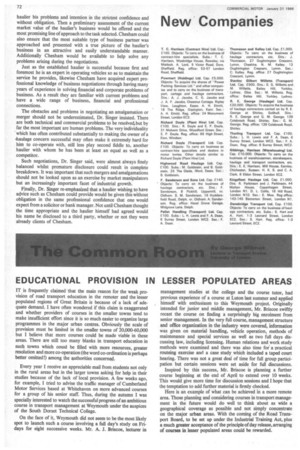EDUCATIONAL PROVISION IN LESSER POPULATED AREAS
Page 74

If you've noticed an error in this article please click here to report it so we can fix it.
IT is frequently claimed 'that the main reason for the weak provision of road transport education in the remoter and the lesser populated regions of Great Britain is because of a lack of adequate demand. I have often wondered if this claim is exaggerated and whether providers of courses in the smaller towns tend to make insufficient effort since it is so much easier to organize large programmes in the major urban centres. Obviously the scale of provision must be limited in the smaller towns of 20,000-60,000 but I believe that more courses could be made viable in these areas. There are still too many blanks in transport education in such towns which could be filled with more resources, greater resolution and more co-operation (the word co-ordination is perhaps better omitted!) among the authorities concerned.
Every year I receive an appreciable mail from students not only in the rural areas but in the larger towns asking for help in their studies because of the lack of local provision. A few weeks ago, for example, I tried to advise the traffic manager of Cumberland Motor Services based at Whitehaven on more advanced courses for a group of his senior staff. Thus, during the autumn I was specially interested to watch the successful progress of an ambitious course in transport management at Weymouth under the auspices of the South Dorset Technical College.
On the face of it, Weymouth did not seem to be the most likely spot to launch such a course involving a full day's study on Fridays for eight successive weeks. Mr. A. J. Briscoe, lecturer in management studies at the college and the course tutor, had previous experience of a course at Luton last summer and applied himself with enthusiasm to this Weymouth project. Originally intended for junior and middle management, Mr. Briscoe swiftly recast the course on finding a surprisingly big enrolment from senior management. In the very full course, management structure and office organization in the industry were covered, information was given on material handling, vehicle operation, methods of maintenance and special services as well as two full days discussing law, including licensing. Human relations and work study methods were examined and there was also time for a practical routeing exercise and a case study which included a taped court hearing. There was not a great deal of time for full group participation but certain sessions were set aside for full discussions.
Inspired by this success, Mr. Briscoe is planning a further course beginning at the end of April to extend over 10 weeks. This would give more time for discussion sessions and I hope that the temptation to add further material is firmly checked.
Here is an example of what can be achieved in a more remote area. Those planning and considering courses in transport management in the future would do well to think about as wide a geographical coverage as possible and not simply concentrate on the major urban areas. With the coming of the Road Transport Board, to be set up under the Industrial Training Act, plus a much greater acceptance of the principle of day release, arranging of courses in lesser populated areas could be rewarded.




















































































































